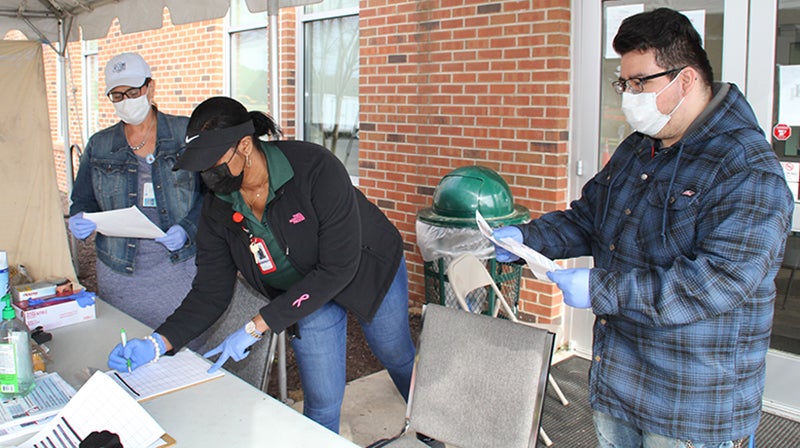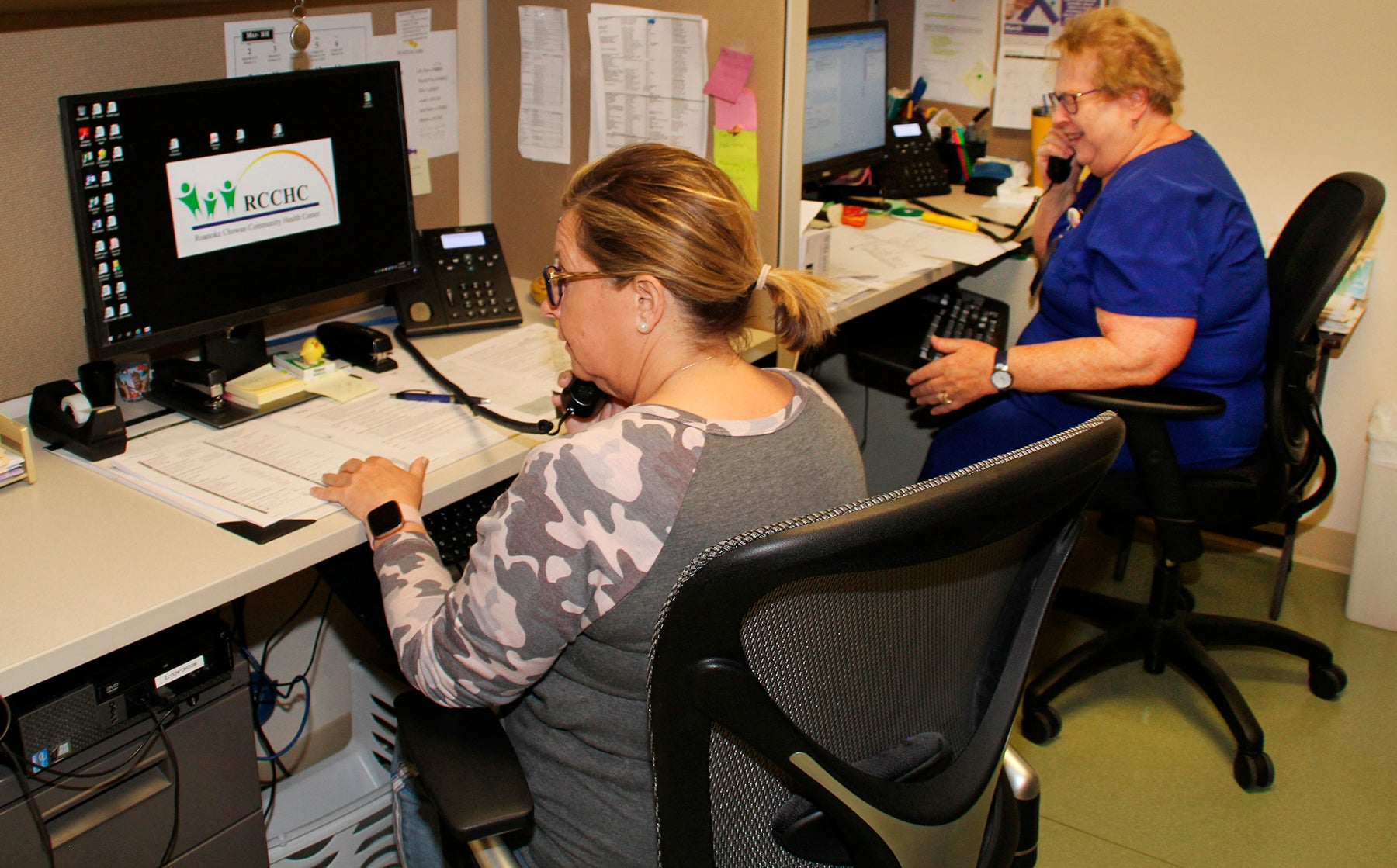Virtual Medicine
Published 6:48 pm Friday, March 27, 2020

- Ahoskie Comprehensive Care Pharmacy Director Angie Kent-Mitchell (center) is joined on Friday morning by Pharmacy Tech Johnna Godwin (left) and Ag Outreach Tech Jorge Gomez as they prepare for the next patient to use a newly opened drive-up area. Pharmacies locally and nationwide are taking extra precautions in an effort to slow the spread of COVID-19. Staff Photo by Cal Bryant
|
Getting your Trinity Audio player ready...
|
AHOSKIE – Extreme times call for extreme measures.
That’s the rallying cry of medical providers as they attempt to balance their normal, everyday practice in the face of the COVID-19 pandemic.
An ally in their corner is an old friend – Telehealth, which refers broadly to electronic and telecommunications technologies and services used to provide care and services at a distance.
Telehealth encompasses a range of practices, including telemedicine and telepsychiatry, which use two-way, real-time interactive audio and video between provider and patient to deliver health care and behavioral health services, respectively. Virtual patient communication is another part of telehealth used to provide evaluation and consultation between provider and patient or between different providers.
Staff at Roanoke-Chowan Community Health Center (RCCHC) – which includes Ahoskie Comprehensive Care, Colerain Primary Care, and Murfreesboro Primary Care – have spent this week contacting patients who had regularly scheduled wellness visits to convert those to phone contacts or Telehealth connections.

Longtime Ahoskie physician Dr. Charles Sawyer speaks to one of his patients by phone. Telehealth is an alternative delivery of healthcare in the face of COVID-19. Staff Photo by Cal Bryant
“We’re still seeing patients for sick visits if necessary; we’re not turning anyone away, but we do encourage them to call us first before making a trip to our offices,” said Kim Schwartz, CEO of RCCHC. “We can triage them over the phone, and we repeat that triage outside our offices prior to them entering the building.”
While the Woodland Primary Care office is temporarily closed (in order to shift resources to the larger offices), the Ahoskie, Colerain and Murfreesboro locations are operational. They are open from 8 am – 5 pm on Monday through Thursday, and 8 am – 4 pm on Friday. There remains a 24/7 on-call provider.
The two local RCCHC pharmacies are open as well. The Ahoskie location offers drive-up service while the one in Colerain is curbside.
As for the Telehealth element, Schwartz said it is “an overwhelming success.”
“We started it on Tuesday of this week and our patients enjoy getting a call from their doctors,” she said. “We can ask medical questions just as they though they were sitting in any of our offices.
“We’re doing everything we can for the health and medical welfare of our patents, especially those with chronic conditions,” Schwartz continued.
The virtual visits also keep people at home during the COVID-19 crisis, especially those most vulnerable to the virus.
“We are making a concerted effort to flatten the curve of new COVID-19 cases,” Schwartz said, “and at the same time keep the burden off of medical facilities and staff who are on the front line of fighting this pandemic. I’ve been a Telehealth proponent for over 20 years. I knew this could work.”
Even with that type of technology, it doesn’t replace the extreme care that is needed for those with COVID-19.
“We are testing and available to do that,” Schwartz said. “If you do not have a primary care provider, call us. We’re here for our patients as well as those who do not have a regular medical provider. We’re first line to keep people out of the hospital. We have top of the line triage support.”
Schwartz said a separate entrance has been designated at the Ahoskie office where patients showing signs of respiratory illness or COVID-19 symptoms are taken. Once inside, those patients are seen by a doctor in an area that is isolated from the rest of the building.

Monica Bracy (left) and Rose Asbell work the phones on Friday at Ahoskie Comprehensive Care to convert patients who had regularly scheduled wellness visits to Telehealth connections. Staff Photo by Cal Bryant
“That also preserves our PPEs (Personal Protection Equipment) as the staff in that part of the building remains there throughout their shift, meaning they do not have to change in and out of their equipment,” Schwartz stressed.
The precautions also extend to the medical staff, not just by them wearing PPEs. Staff members who are deemed at risk by the Centers for Disease Control, to include those over the age of 60, work in an isolated area of the building.
Dr. Charles Sawyer was there on Friday morning of this week, on the phone with one of his patients. He remained loyal to his craft, providing healthy doses of medical advice and accomplishing that without the traditional face-to-face office visit. Despite having 55 years of medical practice to his credit, Dr. Sawyer said he is experiencing a whole new way of providing the expert care he has proudly delivered locally since 1965.
“It’s like a house call without going to a patient’s home,” said the 87-year-old physician. “Yes, I miss the personal contact, a chance to pat them on the shoulder and tell them everything will be okay, but we have to adjust in this crucial time of need.”
This “critical time” also comes with apprehension and fear.
“I equate this to a time of national crisis when I was a young boy,” Dr. Sawyer recalled. “I was 12-years-old and had been to a movie in Windsor one Sunday afternoon. I was walking home on King Street with a friend and all we could hear was the sound of radios coming from the homes along that street.”
That was Dec. 7, 1941.
“What we were hearing were news accounts of the bombing of Pearl Harbor,” he continued. “It really scared me. The degree of anxiety that went with that is very similar to what I’m seeing now with this COVID-19 pandemic.”
However, life goes on and so does medical care. Dr. Sawyer said he is pleased with the way his patients have reacted to this new way of delivering healthcare.
“It’s going surprising well; I think my patients are appreciative for the verbal contact over the phone and it’s a relief for them to talk to a doctor,” he noted. “We are able to connect to a point where we can review what’s going on with them, relieve any anxieties they may have, and making sure they’re staying inside and isolating themselves if needed.”
And for those patients with medical devices at home, they can self-check blood pressure, temperature and blood sugars to share that with their physician.
He was asked for his thoughts on why the level of apprehension and fear was higher with COVID-19.
“Because it’s so highly contagious and right now there is no immunization for it,” Dr. Sawyer answered. “I’m hopeful that in about six months to a year, we’ll see a very good treatment for it and hopefully a vaccine will soon follow to prevent it…..the vaccine is the key.”
RCCHC offices can be contacted for more information on the COVID-19 battle or for how to sign-up for Telehealth. Call 252-332-3548 (Ahoskie office), 252-356-2404 (Colerain office) or 252-398-3323 (Murfreesboro office).


